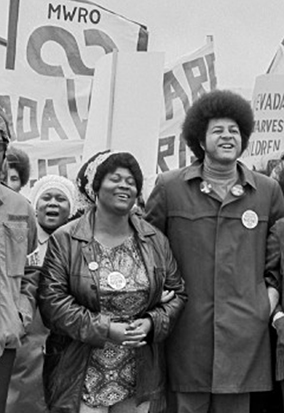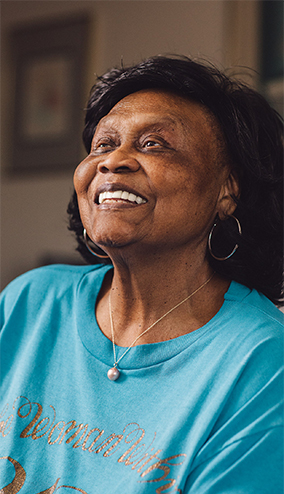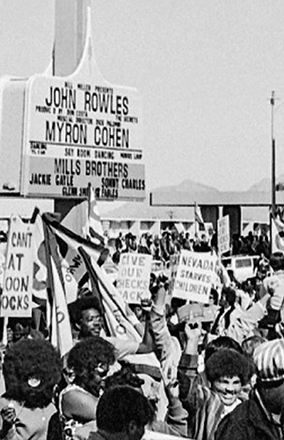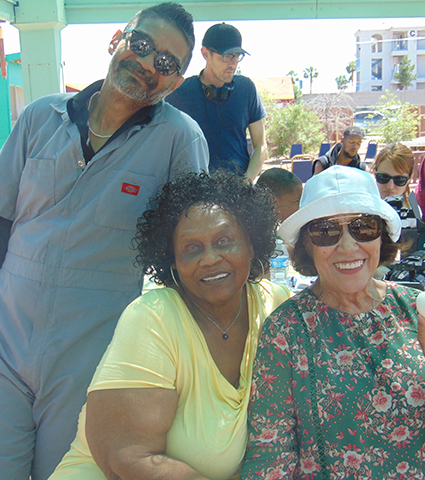Standing up for the voiceless
May 15, 2017 by Las Vegas Black Image Magazine
Filed under Feature
How Ruby Duncan’s decades of activism helped transform life in Las Vegas.
Sixty-five years ago, Ruby Duncan followed her aunt and uncle to Las Vegas from the backwoods of Tallulah, Louisiana. The decision wasn’t easy for the 18-year-old, who lost both of her parents by the age of 3: having once picked cotton in a nearby field, she had landed a job working in a neighborhood drug store that paid her $8 a week. She eventually left her job and packed her bags for the Silver State.
“I came to Las Vegas in 1952 — and remember that as soon as I arrived, my uncle made sure I registered to vote,” says Duncan.
During the 1940s and 1950s, Jim Crow laws and discriminatory practices ruled the day in Las Vegas. Many African-Americans struggled to secure jobs with fair wages to provide for their families. Employment opportunities for black women were almost entirely limited to domestic work. Those conditions led many families to seek government assistance just to survive — and even that was undermined by racism.
“I had seven children of my own and many of the black women in Las Vegas didn’t have access to birth control, so families grew in size,” said Duncan. “But, the Welfare Department in Las Vegas still only gave black families $180 dollars a month — no matter how many children you had — and white women were said to have received more. Also, if you received Welfare you couldn’t have a husband and husbands had to leave their families in order to receive government assistance. I remember only receiving flour, some Pet Milk, one bottle of Karo Syrup and a little jar of peanut butter, and some cheese to feed my children. We wanted a nutritional program like Food Stamps and the WIC program to adequately feed our families healthy meals. But, we had to fight for it.”
And fight they did. Duncan, along with other leading welfare mothers including Rosie Seals and Alversa Beals, formed the Clark County Welfare Rights Organization. On March 6, 1971, they led what was then the largest protest march in the country on behalf of poor women. Over 1,500 people joined the protest on the Las Vegas Strip.
“It was my idea to march down the Las Vegas Strip to Caesars Palace — and everybody else thought I was crazy,” said Duncan. “I told them in order to get the Welfare Department’s attention we have to deal with the economy of Las Vegas and that was to march down the Strip. People came here all the way from London, and everywhere else. Sammy Davis Jr., Jane Fonda, and civil rights leader Ralph Abernathy joined us. Yes, we were fearless but you have to be when you are standing up for what’s right.”
Duncan considers herself an advocate for all disadvantaged people regardless of skin color — but she is dismayed by the lack of activism for poor people in Las Vegas today.

Ruby Duncan leads the protest on the Las Vegas Strip for the rights of Welfare mothers. -Las Vegas News Bureau
“Poor people in Las Vega s are not doing better today because they either don’t have the energy to fight or just don’t want to fight for a better life,” she said. “They don’t understand that it doesn’t take an educated person to get angry and get up and go push for whatever you need for you and your family. The political structure is very different now than it used to be. It was because of people like Bob Bailey and his friends who demanded that the political structure take notice of community issues. The political power structure had to come to the Historic Westside and address black people as to what was going on to make our lives better. Now, we don’t have strong political leaders demanding the same attention to the socio-economic needs of the community — and many of them don’t want to buck the legislative system out of fear that a white politician will get mad at them and run against them in an election.”
Civic engagement and participation are key to bringing positive change in any community, and Duncan hopes that young people will seize the opportunity to lead.
“We have to vote and get educated on the issues,” she said. “The education on community issues should be spoken about within our churches and throughout our community. People still call on me to speak up and to speak out about poor conditions in our community. It’s not that I always know what to say, but I do know what is needed.”








